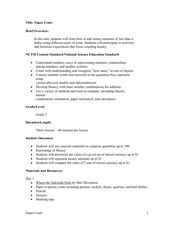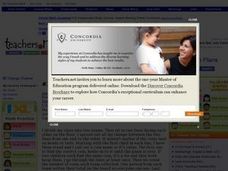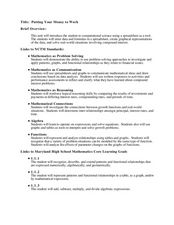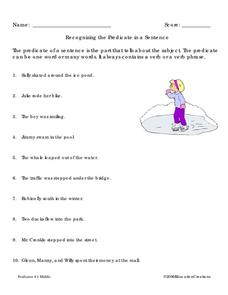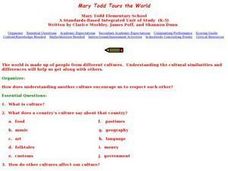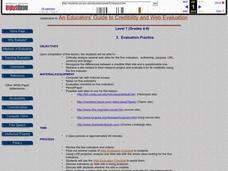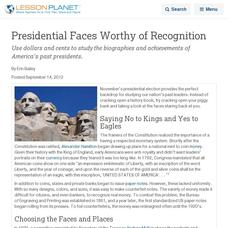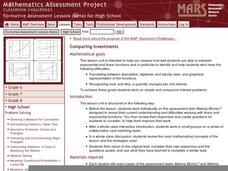Curated OER
Super Cents
Second graders study money amounts less than a dollar. In this math lesson, 2nd graders practice counting coins. Students read various stories and discuss how money was used in the stories.
Curated OER
How Much is that Name?
Students explore money counting. In this money problem solving lesson, students calculate how much money their name is "worth" using the corresponding alphabet letters which have been assigned a coin value.
Curated OER
Savings and Budget
Second graders investigate the concept of developing a budget. In this financial awareness lesson, 2nd graders read the book The Case of the Shrunken Allowance and brainstorm ways they can save and budget money. Students create their own...
Curated OER
Coin Hunt and It's Variations
Students play a game designed to give them practice identifying coin names and values. They form two lines with coins spread out in between the teams and when the teacher calls out a coin, the two in front scramble to find the specified...
Curated OER
Fraction Conversions
Pupils convert between fractions, decimals, and percents using money. In this conversions lesson plan, students play with a mock store in class.
Curated OER
Multiply by Two-Digit Numbers
In this multiplication worksheet, students solve 13 problems in which dollars and cents or 3 digit numbers are multiplied by 2 digits. Students will need to rewrite some of the problems.
Curated OER
Compound Interest Problem
In this compound interest worksheet, students solve 1 word problem about compound interest. Students determine the amount of money two men have to retire given two different saving scenarios.
Curated OER
Withdrawing Money From The BAnk
Students discuss the various options for withdrawing money from the bank. Students recognize the importance of keeping accurate bank records and personal banking information secure. This lesson is intended for students acquiring English.
Curated OER
Teaching Economics Using LUNCH MONEY
Students, after reading the book "Lunch Money" by Andrew Clements, explore money and different saving places. They research different ways in which productivity has increased over the years, they examine products to determine if the...
Curated OER
Learn to Build a Rocket in 5 Days or Your Money Back
Students discover the entire process that goes into designing a rocket for any customer. They study important factors such as supplies, ethics, deadlines and budgets. Also, students explore about the Engineering process, and recognize...
Curated OER
Putting Your Money to Work
Students create a collect data on expenses. In this algebra lesson, students create a spreadsheet to solve scientific equations. They incorporate math, science and technology in this lesson.
Curated OER
Recognizing the Predicate in a Sentence
In this grammar worksheet, students will learn how to find the predicate in a sentence. Then students will find and circle 10 predicates in different sentences.
Curated OER
Wants and Needs
Here is an outstanding lesson on wants versus needs designed for 1st graders. Pupils listen to the book, Something Good which presents themes on wants, needs, choice, resources, and counting money. Pupils complete worksheets embedded in...
Curated OER
Mary Todd Tours the World
Pupils analyze how distinguishing another culture encourages us to respect each other. They research culture and all its avenues, recognizing and comprehending the relationship between people and geography. Ultimately, they can apply...
Curated OER
Evaluation Practice
Learners analyze several web sites for the five indicators: authorship, purpose, URL, currency and design. they Recognize the differences between a credible Web site and a questionable one.
Curated OER
Change Mixer
Students use their abilities to recognize coins and their values in this game that focuses on locomotor skills (skip, slide, gallop, run, jump). This game also requires students to add coin values.
Curated OER
Valentine Shop
Students use Coin Critters software to practice coin recognition. Students complete a printing project for the cover of Valentine cards and use monthly calendars or a hundreds chart to count by 5's and 10's. Students use KidPix to create...
Curated OER
ANDERSONVILLE PRISON: AN ECONOMIC MICROCOSM
Students identify the conditions faced by the prisoners of war at Andersonville during the Civil War. They examine how a group of civil war prisoners developed an economic system within their camp.
Curated OER
Real-World Reasonableness
Fifth graders apply math to real-world situations. In this mathematics lesson, 5th graders are read the book, "Math Curse," which discusses ways in which math is used each day. Students then write a sequel to the book in groups,...
Curated OER
Parts of a Whole
Students recognize coins are worth a fraction of a dollar. They represent the value of different coins by shading in their equivalent fractional parts in the circle. They understand that fractions are part of a whole.
Curated OER
The Penny-- 1 Cent
In this math and reading worksheet, students learn to recognize the penny and read some factual information about it. Students study photographs of the front and back of a penny, and practice printing "penny" on the primary lines.
Curated OER
Presidential Faces Worthy of Recognition
Using dollars and cents to study the biographies and achievements of America's past presidents.
EngageNY
Why Do Banks Pay YOU to Provide Their Services?
How does a bank make money? That is the question at the based of a lesson plan that explores the methods banks use to calculate interest. Groups compare the linear simple interest pattern with the exponential compound interest pattern.
Curated OER
Comparing Investments
Money, money, money. A complete lesson that makes use of different representations of simple and compound interest, including written scenarios, tables, graphs, and equations to highlight similarities and differences between linear and...


